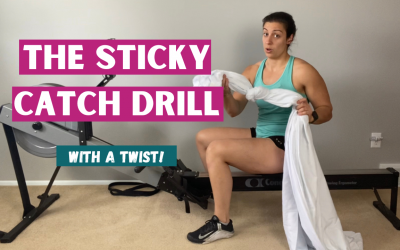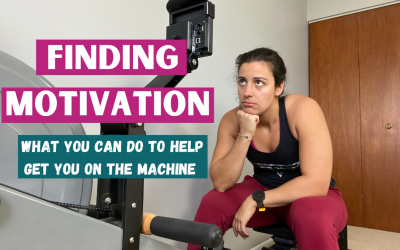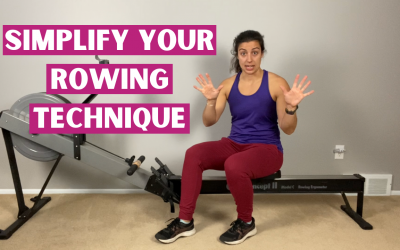4 Life Skills Rowing Gives You
Most of the time when you start a new exercise, you are looking for the physical benefits that it brings. However, as with most things, there are other benefits you don’t realize right away. Only after you’ve noticed something is different do you realize where it came from.
Rowing is one of those things.
I am passionate about rowing not simply because it’s a good workout. There’s so much more to rowing that most people don’t realize. Rowing has taught me so many life skills, and I want to share some of those are with you. Stay until the end because my last point is my favorite.
TIME MANAGEMENT
It seems the busier I am, the better I am with my time. There’s a limit to this, as I don’t recommend being so busy you don’t have time for yourself.
What I mean is, if your day is filled with too much white space it’s much easier to get nothing done than anything at all. I saw this play out a lot in college. My friends who were not in a sport or club didn’t have great time management skills. On the flip side, most (if not all) of my teammates on the rowing team had great time management.
I think this is because we HAD to. We had to have great time management skills to get it all done. If you know you only have so much time to get your homework done, you get it done a lot quicker!
The same principle still applies after college. While there may not be homework anymore, there’s this thing called “going to work” that takes up a lot of time. Having solid time management skills has allowed me to prioritize and take advantage of the time I do have.
This could really be applied to starting any kind of workout routine. When you set aside the time to work out, you’ll have less time for other things. It forces you to learn how to make that time count, and this includes planning your self-care time!
DEDICATION
Setting aside the time to get on the rowing machine day after day will teach you dedication.
Most exercise routines or gym classes will do this too, but I’ve found a deeper sense of dedication when it comes to rowing.
It must be because rowing is just so darn hard. Like, seriously! I’m convinced it’s because you can push yourself harder since you’re sitting down. Have you ever tried standing up after going all-out on the rowing machine? You end up on the floor pretty quickly if you try.
Rowing consistently isn’t easy, and consistency is the only way you’ll get better. Anyone can sit down on a rower and “play around” for 5-10 minutes and they will get little to nothing out of it. But doing full rowing workouts will challenge your body and mind in new ways you didn’t even know were possible.
There’s nothing like getting a new PR (personal record) on your 2k to make that dedication worth it.
This dedication then spills over into life. Have a challenging project at work? If you can get through a 5k on the rowing machine, you can get over that hurdle in your project. Dedication teaches you to keep going even when it’s hard.
FOCUS
When you start getting into rowing, one of the things you’ll learn pretty quickly is that you’ll want to have goal splits for your workout. This is the number on the screen you are working on shooting for.
Regardless of what that number is, if you want to hit that goal it takes a lot of focus.
The second my mind starts wandering in the middle of a piece is when my splits start to get slower. I have to bring myself back to what I’m doing and look at my split again.
Hitting the same number stroke after stroke…stroke after stroke…minute after minute…I think you know where I’m going here. It’s practically the definition of monotonous. I’ve rowed up to 30 minutes pieces with having to lock my focus onto that goal split.
How often can our focus wander on other things in life? It’s important to be able to snap back to what we were trying to focus on in the first place. Don’t lose sight of what your goals are!
EXHAUSTION REALIZATION
You may be thinking “wait, this isn’t a life skill?” but stay with me here and you’ll see what I mean.
How often have you run yourself down to the point of a breakdown? This could be physically, emotionally, or mentally. What if you could realize you were on this path BEFORE you got there?
I’ve talked about the dedication and focus rowing teaches you. These take a lot out of you, so if you’re already physically, mentally, or emotionally exhausted, you’re going to realize it when you get on that rower.
Splits that you normally hold will feel impossible. Everything will feel heavy. Maybe the world starts to feel like it’s crashing down on you because you just wanted ONE thing to go right today. When this happens to me, I know I need to get off.
Sometimes we ignore the flashing red lights our bodies give us when they need a break. For me, rowing turned those lights into sirens that were easily heard and impossible to ignore.
When this happens to me, I know I need to stop and take inventory of what’s going on.
Have I been pushing too much in my workouts? Has it been an emotional day? What’s weighing me down?
Being able to stop, look inside, and realize when we need a break is an important life skill many Americans don’t have today. It’s easy to get caught up in the day to day and miss those flashing red lights. Or simply look away from them if you don’t want to deal with it.
Rowing will MAKE you realize when you need a break, so I encourage you to listen to your body and take it!
The Sticky Catch Drill – with a twist!
The sticky catch drill is a great drill to feel the connection at the catch in your rowing stroke. And I have a different way of doing it that you may have never seen before. Most of the time, for the sticky catch drill, you can use a strap or something very sturdy...
How to Find Motivation to Workout
This post is going to be a little bit different today. I'm going to be talking to you about finding motivation to get on the rowing machine. Just to be clear, this video is NOT for the person who is struggling to take a rest day. This is for you if (for example) you...
Simplify Your Rowing Stroke
When you're just starting to learn how to row, it can be overwhelming watching technique videos, especially if it's a follow along drill or follow along workout where the coach is giving a lot of cues. Examples of cues are chest up, shoulders down, arms out then body...



